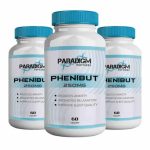
Phenibut Usage For Treating Stress, Anxiety, And Depression
Every job can be stressful. Still, it’s fair to say that some vocations are more stressful than others. Imagine if you were an astronaut in the early days of space travel, back when leaving Earth’s orbit still felt entirely foreign and unknown. Probably pretty stressful, right?
It’s for exactly that reason that, several decades ago, Russian scientists invented a medication called Phenibut. Its purpose was simple: To help Cosmonauts remain clear-headed and calm, even when the task before them seemed incredibly daunting.
The drug worked so well that it’s now used recreationally throughout Russia… and it’s increasingly easy to find in other parts of the world, too. Here in the US, Phenibut is not yet approved by the FDA, but it’s easy enough to find Phenibut for sale online for research purposes.
The obvious question is, is Phenibut all it’s cracked up to be? Will it really help you keep your anxiety in check? And is it a safe way to manage and mitigate stress… even if you don’t happen to be a Cosmonaut?
Phenibut at a Glance
Phenibut is closely related to drugs in the benzos category. That is to say, it affects the GABA receptors in your brain, modulating the excitability of your nervous system.
How exactly does Phenibut affect the body and mind? It really depends on your dosage. Small doses, taken irregularly, have demonstrated an ability to provide a sense of calm and wellbeing. Larger or more frequent doses can be more potent, leading to blurred thinking or overwhelming drowsiness.
Does Phenibut Help with Anxiety?
The real question is, does Phenibut help alleviate the symptoms of anxiety? Is there any scientific backing for its claims?
To answer these questions, it’s important to take a closer look at some of the clinical research that’s been done. Here are some highlights.
- One study affirms that Phenibut can be an effective neuropsychotropic drug, relieving symptoms of anxiety, tension, stress, and fear.
- Animal trials confirm that Phenibut lessens neurological agitation, making it an effective therapy for reducing anxious feelings and behaviors.
- It’s also worth noting, more sociologically, that Phenibut has been widely used on a recreational basis for decades, and that many users find it to be a convenient way to enjoy a mild “high.”
Is Phenibut Safe?
Given that Phenibut is not currently approved by the FDA, it’s worth asking whether it’s actually safe to use.
The short answer is that, as with any neuropsychotropic drug, the benefits must be weighed against potential risks. Phenibut often works well when it’s administered therapeutically, while overuse can contribute to significant concerns.
One notable study confirms this, finding that sensible use of Phenibut can be safe and well-tolerated. It’s only when Phenibut is overdosed that questions of dependence or intoxication arise.
Other studies confirm that, in high and frequent doses, Phenibut can lead to effects not dissimilar to alcohol withdrawal syndrome.
The bottom line: It’s important to proceed cautiously with any new supplement or medication. The risks surrounding Phenibut are not insignificant, but they can generally be kept in check through responsible use.
How to Purchase Phenibut
For those who do wish to try Phenibut as a way to relieve anxiety, the next question is… how? Given that the substance isn’t currently FDA-approved, it’s not something you can get from a brick-and-mortar health store in the United States. It’s easy to get it online, but is doing so safe?
Generally speaking, the best strategy with any supplement is to ensure a manufacturer that’s based in the United States, adhering to American standards of quality control, safety, and purity. Beyond that, it’s always wise to double check with a doctor before trying any new supplement, if only to ensure no unwanted drug interactions.
Phenibut: The Next Frontier in Anxiety Treatment?
It’s too early to say if and to what extent Phenibut will catch hold in the United States. For now, it remains a curious and promising new treatment, undeniably effective though not without some peripheral concerns.
Guest Posts Author Bio
Amanda E. Clark is a contributing writer to Paradigm Peptides. She has experience in writing about health and supplements topics, including holistic remedies such as peptide therapy.
References
Lapin, I. (2006). Phenibut (β‐Phenyl‐GABA): A Tranquilizer and Nootropic Drug. Cns Drug Reviews, 7, 471-481. https://doi.org/10.1111/J.1527-3458.2001.TB00211.X.
Ziablintseva, E., & Pavlova, I. (2009). [Influence of GABA agonist phenibut on the neuronal activity and interaction in hippocampus and neocortex in emotionally negative situations].. Rossiiskii fiziologicheskii zhurnal imeni I.M. Sechenova, 95 9, 907-18 .
Lapin, I. (2001). Phenibut (beta-phenyl-GABA): a tranquilizer and nootropic drug.. CNS drug reviews, 7 4, 471-81 .
Kupats, E., Vrublevska, J., Zvejniece, B., Vavers, E., Stelfa, G., Zvejniece, L., & Dambrova, M. (2020). Safety and Tolerability of the Anxiolytic and Nootropic Drug Phenibut: A Systematic Review of Clinical Trials and Case Reports. Pharmacopsychiatry, 53, 201 – 208. https://doi.org/10.1055/a-1151-5017.
Jouney, E. (2019). Phenibut (β-Phenyl-γ-Aminobutyric Acid): an Easily Obtainable “Dietary Supplement” With Propensities for Physical Dependence and Addiction. Current Psychiatry Reports, 21, 1-6. https://doi.org/10.1007/s11920-019-1009-0.






